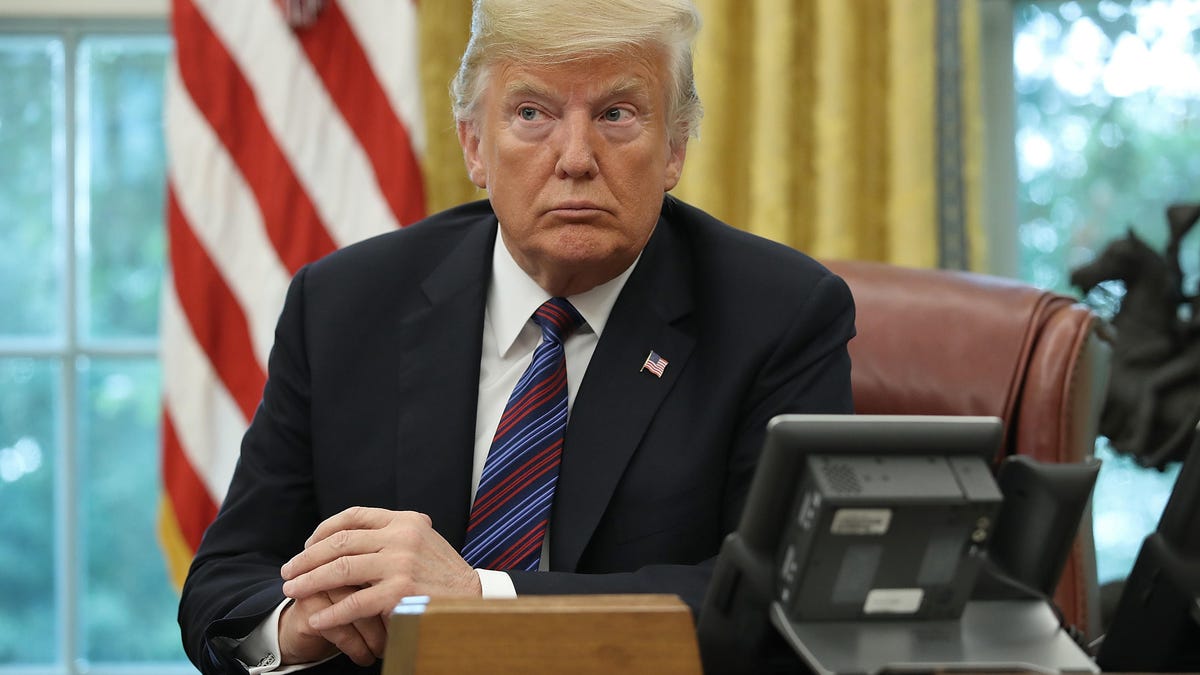Trump warns tech giants may be in 'antitrust situation'
The president steps up his attack on companies he says push liberal points of view.

President Donald Trump has accused Silicon Valley companies of liberal bias and suppression of conservative voices.
President Donald Trump is turning up the heat on tech companies he says support liberal points of view, suggesting Thursday that they may be in a "very antitrust situation."
"I won't comment on the breaking up, of whether it's that or Amazon or Facebook ," Trump said in an Oval Office interview Thursday with Bloomberg News. "As you know, many people think it is a very anti-trust situation, the three of them. But I just, I won't comment on that."
He also reiterated his accusation that "conservatives have been treated very unfairly" by Google . "I tell you there are some moments where we say, 'Wow that really is bad, what they're doing.'"
Trump's latest comments follow a string of criticism he's leveled at Silicon Valley, accusing companies such as Google, Facebook and Twitter of liberal bias and suppression of conservative voices. On Tuesday, Trump accused Google of doctoring its search results for "Trump News" to show only negative coverage about him -- a charge Google denied.
"They are controlling what we can & cannot see. This is a very serious situation-will be addressed!" Trump said in a tweet Tuesday, adding in a later Oval Office discussion that Google, Twitter and Facebook are "really treading on very, very troubled territory, and they have to be careful."
On Wednesday, Trump tweeted a video that accused Google of not promoting his State of the Union addresses on its home page after years of doing so for former President Barack Obama's speeches. Google responded by saying it didn't promote either president's first speech to the Congress because they aren't technically a State of the Union address.
Earlier Thursday, Republican Sen. Orrin Hatch of Utah sent a letter (PDF) to the Federal Trade Commission asking it to re-examine Google's search and digital advertising practices, calling reports of anticompetitive conduct by the company "disquieting."
In 2013, the FTC closed an investigation into whether Google's search results were unfairly biased in favor of its own products, with commissioners unanimously deciding that Google wasn't violating any antitrust laws regarding search results.
Trump's comments come as representatives from Google, Facebook and Twitter are expected to testify before Congress next week over a range of topics, including election meddling, disinformation and data misuse. A number of the biggest internet and social media companies have also drawn flak for the perception that they reflect a liberal bias.
Earlier this month, Trump accused social media companies of "totally discriminating against Republican/Conservative voices" in a series of tweets after far-right conspiracy theorist and Infowars host Alex Jones was banned from several major tech platforms.
Last Friday, Trump expanded on the point, saying that social media companies "are silencing millions of people" and that people must be allowed to "figure out what is real, and what is not, without censorship."
Amazon and Facebook declined to comment on Trump's latest comments, while Google didn't immediately respond to a request for comment. The White House didn't immediately respond to a request for comment.
What is QAnon? The Deep State vs. Trump conspiracy, explained.
Follow the money: Google's US political advertising report shows Trump as biggest spender

